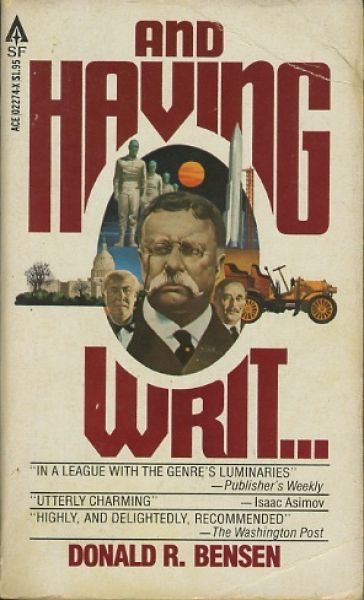Things I Once Enjoyed
And Having Writ…
By Donald R. Bensen

13 Mar, 2022
Donald R. Bensen’s 1978’s And Having Writ… is a stand-alone comedic alternate history novel.
Due to mechanical failure during re-entry, first contact between humanity and the crew of the starship Wandererseems certain to come in the form of a high-velocity impact near the location known to humans as Tunguska. This catastrophe is avoided, thanks to skillful piloting and cutting-edge tech. The Wanderer is able to divert and set down in the Pacific.
On board: Captain Dark, Recorder Raf, Metahistorian Ari, and Integrator Valmis.
Explorers have been given strict non-contact guidelines, but these do not take into account being marooned on alien worlds. The guidelines particularly do not cover this particular case: primitive locals, having retrieved the extraterrestrials crewing it, accidentally sink the starship in the Pacific.
If Dark, Raf, Ari, and Valmis are to get home, they will need to use local resources to do so. Local resources are, alas, currently insufficient.
1908 America is perhaps the most advanced region on Earth, yet American technology is barely Level Four. Even very basic starships require Level Seven technology. A culture which has only mastered basic mechanical and chemical technology, a world where heavier than air flight requires cunning application of aerodynamics rather than simple anti-gravity, will not be able to replace Wanderer. The four are stuck.
Having come to the attention of American authorities almost as soon as they arrive in San Francisco, the four do their best to encourage the natives to treat their visitors well, spinning tales of a glorious Galactic Empire that would be very unhappy if their representatives were sacrificed to whatever gods Americans worship. This is pure fiction: many civilizations have mastered starflight, but there’s almost no trade and certainly no empires out in the stars. However, a Galactic Empire is a lie Americans might believe.
Having had time to study terrestrial society, Metahistorian Ari believes there is more hope of escape from Earth than first was obvious. Luckily for the aliens, although rather less so for humans, Earth is on the brink of global war. Precisely which nations will end up fighting each other is unclear, but given contemporary politics, a world war of some kind seems inevitable. Wars have a salutatory effect on technology. Level Seven may be closer than it appears.
The explorers are impatient. Rather than wait for war to happen on its own timetable, the four decide to visit the crowned heads of Europe. They plan to explain the historical processes at work and encourage the monarchs to launch their empires into transformative war as soon as possible. Once a few million corpses are fed into the machine of progress, no doubt marvelous new technology will emerge!
The American president, however, believes that America should have a monopoly on alien technology. He proposes imprisoning and interrogating the aliens.
This is only the first impediment to the explorers’ glorious plan.
~oOo~
The novel is told from Raf’s perspective. Somehow when I first read this, many years ago, I completely overlooked what a raging alcoholic Raf is. Each of the aliens deals with being stuck on Earth in their own way. Raf’s is to spend as much time as he can potted.
The reason the aliens decide to focus on monarchs is because elected leaders think only as far ahead as the next election, whereas monarchs have to think of long-term consequences. This raises questions about alien governments. These questions are not answered.
I also found myself wondering how the aliens picked their explorers. The novel strongly suggests that explorers are selected from those who will not be missed should they fail to come home.
It becomes very clear that while the aliens command impressive technology, they themselves are not terribly discerning or particularly bright. They believe, for example, that national leaders would embrace horrific war provided only that its nature be clearly conveyed to them1. They also have a habit of offhandedly fixing medical conditions untreatable by terrestrial means — King Edward VII’s cardiac issues, Kaiser Wilhelm II’s arm, Alexei Nikolaevich’s hemophilia — without ever considering long-term consequences. In short, the aliens are confident idiots.
The setting isn’t lavishly detailed; this is a fairly short novel without too much room for introspection. Nor for nuanced characters. Well-known historical figures are caricatures who behave in ways that advance the plot or are at least amusing (Rasputin, for example, decamps Russia for the American entertainment industry). The result is a sporadically amusing novel.
Other people seem to have enjoyed this more than I did, as the novel was a contender for a John W. Campbell Memorial Award, losing out to Michael Moorcock’s Gloriana (which I really have to stop thinking of as that new Moorcock novel).
And Having Writ… is out of print.
1: It occurs to me that while Raf can document current events, Ari understands great impersonal forces of history, Valmis is a mystic, and Dark a capable engineer, they don’t have an anthropologist or anyone with much in the way of people skills.
Also notable by their lack: there are no women on the team and the text suggests this is perfectly normal, not a quirk of the statistics of small sets. Curiously, alien society seems to function much like that of mid-century America as far as gender roles are concerned.
